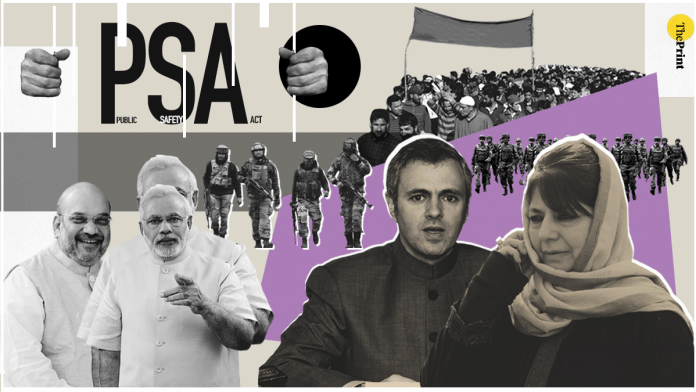Former Jammu and Kashmir chief ministers Farooq Abdullah, Omar Abdullah and Mehbooba Mufti are now booked under the Public Safety Act. Omar Abdullah and Mufti had been under six months of preventive detention after the dilution of Article 370. Congress leader P. Chidambaram has condemned their detention and called PSA “draconian”.
ThePrint asks: Former J&K CMs under PSA: Modi govt taking shortcuts instead of hard political engagement?
Modi govt’s decision shows it is committed to bulldozing political contract between J&K and Indian Union
 Arjimand Hussain Talib
Arjimand Hussain Talib
Writer and columnist
There is barely any rationale behind booking political leaders in Jammu and Kashmir under PSA. I don’t think the BJP understands that by pulling these former CMs out of J&K’s political arena, a risky vacuum is left behind and the democratic political constituencies they represent are being made irrelevant.
This is not only a shortcut to avoid political engagement, it is also an ill-thought shortcut that continues to strangle democracy, basic political freedom and civil liberties in the region. This must be viewed in the context of the big political betrayals this political class has been subjected to right after the dilution of Article 370. Moreover, these decisions don’t help the cause of durable political resolution, peace and stability in the Valley. It is important to recognise that these political leaders had been working towards achieving sustainable peace in J&K through engagement, dialogue, consultation and democratic means of representation.
The Modi government may feel that in the short-term these measures can contain political dissent or opposition, but in the medium and long term, this approach is simply unsustainable. The ruling party is using development as a smokescreen to further their political agenda, which is to erode the cultural and political identity of Kashmir. This is the latest example of how it is committed to bulldozing the political contract between J&K and the Union of India.
Omar & Mehbooba must be appropriately charged if their collaboration with separatists is proved
 Amit Raina
Amit Raina
Spokesperson, Roots in Kashmir
The wheel of Karma rotates fast. The PSA act which was introduced by Sheikh Mohammed Abdullah to silence his political opponents is today being used to silence his political heirs. The ’87 election rigging, the venomous statements of Omar and Mehbooba during the Amaranth land row which led to protests and riots across J&K and led to the revival of terrorism in Kashmir, are also facts that cannot be ignored.
Unfortunately, the Narendra Modi government has kept its strategy aside and been more tactical in its approach in J&K. While the current perception is that Kashmiris may not be too upset about the detention of these leaders, it does not take away the fact that the National Conference is still a big political force in the region, the same party that had helped the Indian government revive the political process in J&K during the peak of militancy in 1996.
The solution to any political problem, however violent it may be, is to have involvement of all strands of political thought, especially with those who still command a sizeable following. If, however, it is true that the Muftis and the Abdullahs have collaborated with separatists, then they must be appropriately charged for their crimes.
Additionally, the Modi government needs to have a clear blueprint for the return of the displaced Kashmiri Pandits in the region. Arbitrary thought process will not help the problem but only aggravate it.
BJP wants to impose its terms & conditions on J&K politics and views these leaders as obstacles
 Khalid Shah
Khalid Shah
Associate Fellow, ORF
In wielding an iron-fist in the aftermath of the dilution of Article 370, the Narendra Modi government doesn’t seem to have a political endgame in Kashmir. After executing a successful security operation, there are no plans for development or political engagement in the Valley.
Mehbooba Mufti, Omar Abdullah and Farooq Abdullah have strangely been booked under an Act that is frequently used against stone-pelters and separatists. Judicial review will follow only after three months.
It is clear that the BJP is pursuing a vendetta against these leaders for their earlier statements about the Modi government, and is adopting various delaying tactics to not have any constructive dialogue. If statements are the metric to judge whether a person is a threat to public safety, then I believe a large number of BJP leaders ought to be behind bars.
I think the ruling party wants to impose its terms and conditions on how to do politics in J&K and views these leaders as obstacles. The Valley has had to suffer as a result. There is hardly any political activity on the ground, despite J&K being converted into a Union Territory, and I don’t see an election taking place very soon. The BJP should learn from the 1987 Jammu and Kashmir assembly election rigging that had major consequences in the region.
Govt needs to take a bottom-up approach to politics in Kashmir. Leadership must not be thrust upon people
 Aarti Tikoo Singh
Aarti Tikoo Singh
Foreign & Strategic Affairs Editor, IANS
Jammu and Kashmir, now a union territory, was never a state where politics had been done on normal terms of engagement. In the last 30 years, Kashmir has turned into a permanent theatre of war for Pakistan where modes of dialogue and negotiations are different than in any other part of India.
With the dilution of Article 370, Kashmir’s socio-political dynamic has been reset after decades of violence and terror. Even as India congratulated itself for its electoral democracy in Kashmir, there wasn’t normalcy. Democratic politics accompanied by constant violence cannot produce normal outcomes.
The Indian government needs to take a bottom-up approach to politics in the Valley. Leadership must emerge organically and not be thrust upon the people of Kashmir. From that perspective, panchayat elections are the right way to go. That is the real hard political engagement.
Omar Abdullah and Mehbooba Mufti have been booked under PSA for their provocative statements on the abrogation of Article 370.
PSA shows BJP is afraid to face these leaders on the ground politically and democratically
 Noor Ahmed Baba
Noor Ahmed Baba
Professor, Central University of Kashmir
There is no legal or political justification for the actions taken against former Jammu and Kashmir chief ministers Omar Abdullah, Farooq Abdullah and Mehbooba Mufti — people who have been entrenched in both Kashmir and Delhi’s politics. These leaders were the symbols of the Indian state in the erstwhile state.
Omar was, in fact, very popular during the Atal Bihari Vajpayee-led NDA government when he briefly served as the Minister of State for External Affairs. Mufti and Farooq have also been deeply trapped by mainstream politics. Both were once in alliance with the BJP. If these political leaders could be trusted to represent India, why are they now being treated like separatists?
The BJP seems to be afraid to face the leaders politically and democratically on the ground. The party’s decision to book them under the Public Safety Act (PSA) reveals a certain anxiety that the Modi government has about its decisions on Kashmir, especially the scrapping of J&K’s special status. So, the government has instead opted for the politics of avoidance.
Also, development in Kashmir has taken a back seat because of the tense political atmosphere in Delhi. At the core of development is education, which has suffered a serious blow since 5 August 2019. Participatory politics is another factor and that too has been hampered by wielding draconian laws like the PSA to prolong the detention of mainstream leaders in the Valley.
Also read: Envoys in Kashmir: Is it just domestic optics or attempt to address global backlash?
By Pia Krishnankutty, journalist at ThePrint







Roshni nazar nahin aa rahi. A tunnel that grows deeper and darker as one moves forward. 2. CM Omar Abdullah once said he was not Indian enough for Delhi and not Kashmiri enough for the people of the Valley. That is the dilemma these tiny midgets who are being raised as bonsai plants to represent the people of Kashmir will confront. The whole lot of them are not worth one cup of kahwa. 3. The Army and the security establishment will take care of Pakistan and its perfidies. At enormous financial cost, of course. The people of Kashmir need to be won over. The other approach did not work before 5th August. Recent constitutional changes will widen the gulf. Adding to everyone’s misery is the evisceration of the economy, led by tourism and the fruit trade, handicrafts, even the nascent net related activities. 4. A time for Insaaniyat, Kashmiriyat , Jamhooriyat.